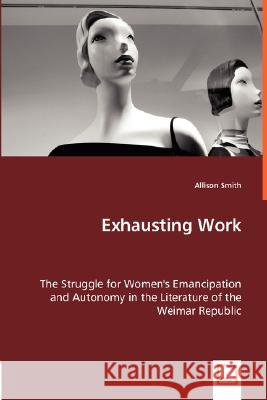Exhausting Work - The Struggle for Women's Emancipation and Autonomy in the Literature of the Weimar Republic » książka
Exhausting Work - The Struggle for Women's Emancipation and Autonomy in the Literature of the Weimar Republic
ISBN-13: 9783836478878 / Angielski / Miękka / 2008 / 104 str.
Exhausting Work - The Struggle for Women's Emancipation and Autonomy in the Literature of the Weimar Republic
ISBN-13: 9783836478878 / Angielski / Miękka / 2008 / 104 str.
(netto: 208,74 VAT: 5%)
Najniższa cena z 30 dni: 218,66
ok. 10-14 dni roboczych.
Darmowa dostawa!
Germany's first democracy, the Weimar Republic, affected every aspect of life, particularly for women, who were granted such rights as the right to vote and equal pay for equal work. These rapid advancements combined with a strong economy and an increasing interest in popular culture, such as movies and sports, made possible the media creation of the New Woman. This book discusses four major works of the period--two dramas by Ernst Toller and two novels by Irmgard Keun--in terms of their portrayal of gender, both of traditional masculinity and femininity and of newer attitudes brought out in the period of the Neue Sachlichkeit. The analysis will explore what made the New Woman "new" and the reasons why she was never a reality for most German women. This book should be useful to those interested in German history, literature, and women's studies.
Germanys first democracy, the Weimar Republic, affected every aspect of life, particularly for women, who were granted such rights as the right to vote and equal pay for equal work. These rapid advancements combined with a strong economy and an increasing interest in popular culture, such as movies and sports, made possible the media creation of the New Woman. This book discusses four major works of the period--two dramas by Ernst Toller and two novels by Irmgard Keun--in terms of their portrayal of gender, both of traditional masculinity and femininity and of newer attitudes brought out in the period of the Neue Sachlichkeit. The analysis will explore what made the New Woman "new" and the reasons why she was never a reality for most German women.This book should be useful to those interested in German history, literature, and womens studies.











